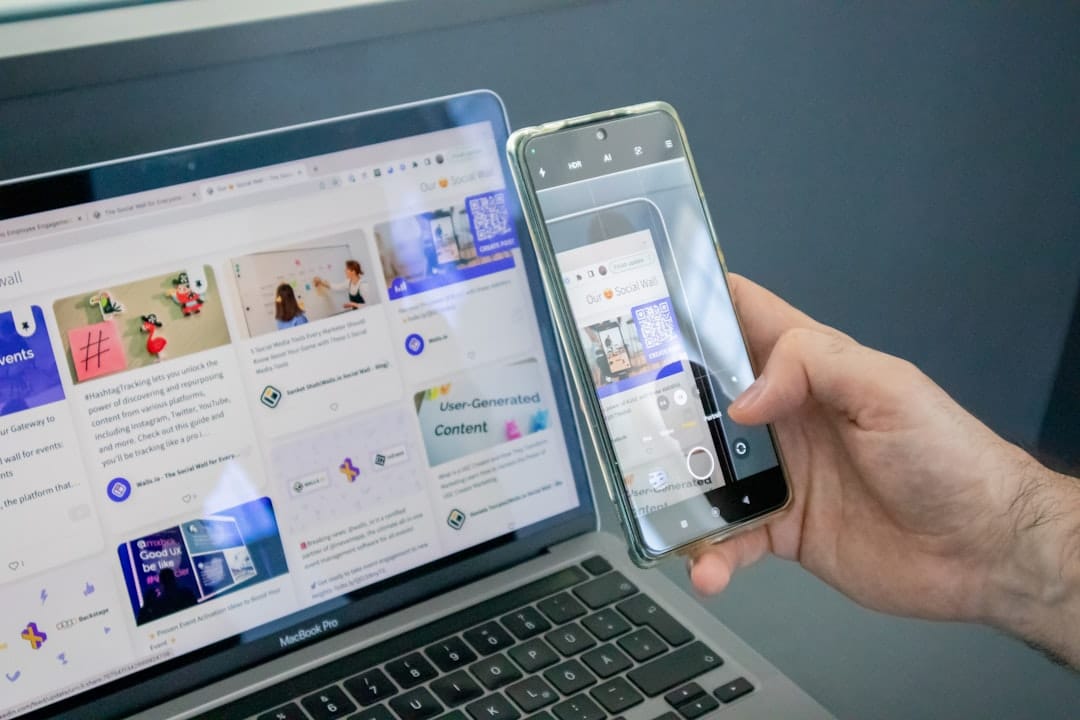In the contemporary landscape of education, mobile platforms have emerged as pivotal tools that facilitate lifelong learning. The proliferation of smartphones and tablets has transformed how individuals access information, engage with educational content, and connect with peers and mentors. Lifelong learning, defined as the continuous pursuit of knowledge and skills throughout an individual’s life, is increasingly supported by these mobile technologies.
This shift is not merely a trend; it represents a fundamental change in the way we think about education, moving away from traditional classroom settings to more dynamic, accessible, and personalized learning environments. Mobile platforms enable learners to engage with educational materials anytime and anywhere, breaking down geographical and temporal barriers that once limited access to knowledge. This democratization of learning resources empowers individuals from diverse backgrounds to pursue their interests and professional development at their own pace.
As a result, lifelong learning has become more than just a concept; it is now an achievable goal for many, thanks to the capabilities offered by mobile technology. The integration of mobile platforms into the learning process has not only enhanced accessibility but has also fostered a culture of continuous improvement and adaptability among learners.
Key Takeaways
- Mobile platforms provide opportunities for lifelong learning, allowing individuals to access diverse learning resources and personalized learning experiences.
- Access to diverse learning resources on mobile platforms enables individuals to explore a wide range of topics and subjects, enhancing their knowledge and skills.
- Personalized learning experiences on mobile platforms cater to individual learning styles and preferences, making the learning process more effective and engaging.
- Collaborative learning opportunities on mobile platforms enable individuals to connect with peers and experts, fostering a sense of community and shared learning experiences.
- Flexibility and convenience offered by mobile platforms allow individuals to learn at their own pace and schedule, making learning more accessible and adaptable to their lifestyles.
Access to Diverse Learning Resources
One of the most significant advantages of mobile platforms in the context of lifelong learning is the unparalleled access to diverse learning resources. With just a few taps on a screen, learners can explore a vast array of materials, including e-books, online courses, podcasts, videos, and interactive simulations. This wealth of information caters to various learning styles and preferences, allowing individuals to choose resources that resonate with them personally.
For instance, visual learners may benefit from video tutorials, while auditory learners might prefer podcasts or audiobooks. Moreover, mobile platforms often aggregate content from multiple sources, providing learners with a comprehensive view of a subject matter. For example, platforms like Coursera and Udemy offer courses from renowned universities and industry experts, while apps like Khan Academy provide supplementary materials that reinforce concepts learned in formal education settings.
This diversity not only enriches the learning experience but also encourages learners to explore interdisciplinary connections, fostering a more holistic understanding of complex topics. As learners navigate through these resources, they can curate their own educational journeys, selecting materials that align with their goals and interests.
Personalized Learning Experiences

Personalization is a hallmark of modern education, and mobile platforms excel in delivering tailored learning experiences. Through adaptive learning technologies, these platforms can analyze user behavior and preferences to recommend content that aligns with individual needs. For instance, language learning apps like Duolingo utilize algorithms to assess a learner’s progress and adjust the difficulty of exercises accordingly.
This ensures that users are neither overwhelmed by challenging material nor bored by content that is too easy. Furthermore, personalized learning extends beyond mere content recommendations; it encompasses the entire learning journey. Mobile platforms often allow users to set specific goals and track their progress over time.
This self-directed approach empowers learners to take ownership of their education, fostering intrinsic motivation. For example, fitness apps that incorporate educational components can help users learn about nutrition while tracking their exercise routines. By integrating personal interests with educational objectives, mobile platforms create a seamless blend of learning and life experiences.
Collaborative Learning Opportunities
Collaboration is a critical component of effective learning, and mobile platforms facilitate connections among learners across the globe. Social media features integrated into educational apps enable users to share insights, ask questions, and collaborate on projects in real-time. For instance, platforms like Slack or Microsoft Teams are not only used for professional communication but also serve as collaborative spaces for study groups or project teams.
This connectivity allows learners to benefit from diverse perspectives and expertise, enriching their understanding of various subjects. Moreover, mobile platforms often host forums or discussion boards where learners can engage in meaningful conversations about course content or related topics. These interactions foster a sense of community among learners who may never meet in person but share common interests and goals.
Collaborative projects can also be facilitated through cloud-based tools like Google Docs or Trello, enabling users to work together seamlessly regardless of their physical locations. This collaborative spirit not only enhances the learning experience but also prepares individuals for the increasingly interconnected world they will encounter in their careers.
Flexibility and Convenience
The flexibility offered by mobile platforms is one of their most appealing features for lifelong learners. Traditional educational settings often impose rigid schedules that may not accommodate the diverse commitments individuals face in their daily lives. Mobile learning allows users to engage with educational content at their convenience—whether during a commute, while waiting in line, or after hours at work.
This adaptability is particularly beneficial for adult learners who may be balancing jobs, family responsibilities, and other obligations. Additionally, the convenience of mobile platforms means that learners can easily switch between different types of content based on their immediate needs or interests. For example, someone might start their day with a podcast on leadership principles during their morning commute and later dive into an online course on project management during lunch breaks.
This fluidity enables learners to integrate education into their lives seamlessly rather than viewing it as a separate endeavor that requires significant time investment.
Interactive and Engaging Learning Experiences

Mobile platforms have revolutionized the way educational content is delivered by incorporating interactive elements that enhance engagement. Traditional methods of instruction often rely heavily on passive consumption of information; however, mobile applications frequently employ gamification techniques to make learning more enjoyable and effective. For instance, language learning apps like Babbel use quizzes and interactive exercises that reward users for completing tasks, thereby motivating them to continue their studies.
Moreover, augmented reality (AR) and virtual reality (VR) technologies are increasingly being integrated into mobile learning experiences. These immersive tools allow learners to explore complex concepts in a hands-on manner. For example, medical students can use VR simulations to practice surgical techniques in a risk-free environment before applying their skills in real-life situations.
Such interactive experiences not only deepen understanding but also make learning memorable by engaging multiple senses.
Tracking Progress and Setting Goals
The ability to track progress is a crucial aspect of effective lifelong learning, and mobile platforms provide robust tools for this purpose. Many educational apps come equipped with analytics features that allow users to monitor their performance over time. For instance, platforms like LinkedIn Learning offer completion certificates and progress tracking dashboards that help learners visualize their achievements and identify areas for improvement.
This data-driven approach fosters accountability and encourages users to stay committed to their educational pursuits. Setting goals is another vital component of successful learning experiences. Mobile platforms often allow users to establish specific objectives—whether mastering a new skill or completing a certain number of courses within a timeframe.
By breaking down larger aspirations into manageable milestones, learners can maintain motivation and celebrate small victories along the way. This structured approach not only enhances focus but also cultivates a growth mindset as individuals recognize their capacity for improvement through consistent effort.
Overcoming Barriers to Learning
Despite the numerous advantages offered by mobile platforms for lifelong learning, challenges still exist that can hinder access to education.
This disparity can limit opportunities for individuals in underserved communities or developing regions who may benefit greatly from mobile learning resources.
Additionally, some learners may struggle with self-discipline when engaging with mobile platforms due to distractions inherent in digital environments. Notifications from social media or other applications can divert attention away from educational content, making it difficult for individuals to stay focused on their studies. To address these challenges, educators and developers must prioritize creating inclusive content that is accessible across various devices while also promoting strategies for effective time management and concentration.
In conclusion, while mobile platforms present remarkable opportunities for lifelong learning through diverse resources, personalized experiences, collaboration, flexibility, interactivity, progress tracking, and overcoming barriers, it is essential to remain vigilant about addressing the challenges that accompany this digital transformation in education. By fostering an inclusive environment that prioritizes accessibility and engagement, we can ensure that lifelong learning remains an attainable goal for all individuals seeking knowledge and personal growth throughout their lives.
In the rapidly evolving landscape of education, mobile platforms have become pivotal in enhancing lifelong learning opportunities. These platforms offer flexibility and accessibility, allowing learners to engage with educational content anytime and anywhere. A related article that delves into the technological advancements supporting such educational tools is com/the-best-software-for-social-media-management-in-2023/’>The Best Software for Social Media Management in 2023.
This article explores how effective software solutions can streamline communication and content sharing, which are essential components of modern educational platforms. By leveraging these tools, educators and learners can create more interactive and engaging learning experiences, further promoting continuous education and skill development.
FAQs
What are mobile platforms?
Mobile platforms refer to the operating systems and software that enable mobile devices such as smartphones and tablets to run applications and access the internet. Examples of mobile platforms include iOS, Android, and Windows Mobile.
How do mobile platforms enhance lifelong learning opportunities?
Mobile platforms enhance lifelong learning opportunities by providing access to a wide range of educational resources and tools. Users can access online courses, educational apps, e-books, and multimedia content on their mobile devices, allowing them to learn anytime and anywhere.
What are some examples of educational resources available on mobile platforms?
Educational resources available on mobile platforms include language learning apps, educational games, virtual classrooms, video lectures, digital libraries, and interactive study tools. These resources cater to various learning styles and subjects, making it easier for individuals to engage in lifelong learning.
How do mobile platforms support personalized learning experiences?
Mobile platforms support personalized learning experiences by offering adaptive learning technologies, personalized recommendations, and customizable study plans. Users can tailor their learning experience to their individual needs and preferences, allowing for a more effective and engaging learning process.
What are the benefits of using mobile platforms for lifelong learning?
The benefits of using mobile platforms for lifelong learning include flexibility, convenience, accessibility, and the ability to learn at one’s own pace. Mobile platforms also offer interactive and engaging learning experiences, as well as opportunities for collaboration and networking with other learners.

